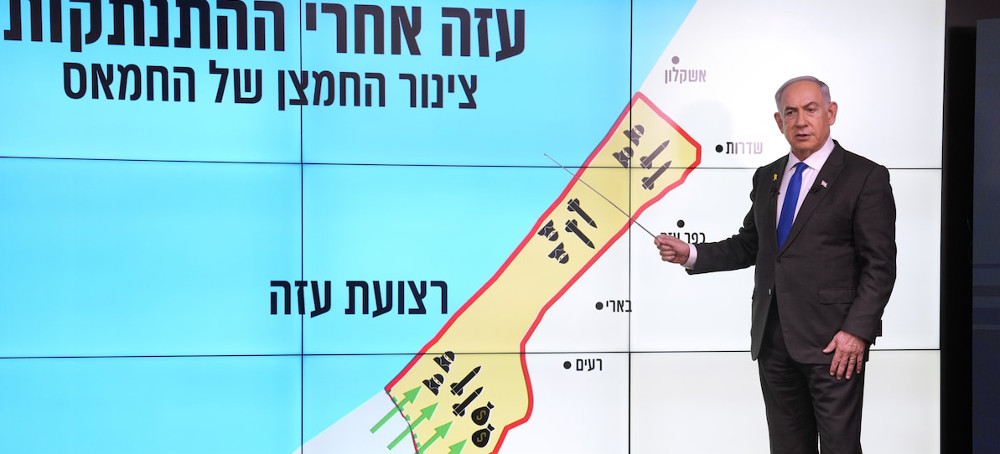Netanyahu Still Wants More War
Ishaan Tharoor The Washington Post Israeli Prime Minister Benjamin Netanyahu at news conference Monday. (photo: Shutterstock)
Israeli Prime Minister Benjamin Netanyahu at news conference Monday. (photo: Shutterstock)
ALSO SEE: Gaza Just Had Its First Polio Victim in 25 Years. This War Cannot Continue
The Israeli leader’s critics argue he would rather prolong the war to assuage his far-right allies (and keep hold of power) than clinch a deal that stops hostilities and frees the remaining hostages.
Whatever the merits of that view, a lot of water has flowed under the bridge since the Oslo accords and failed talks at Camp David. Israeli security concerns and de facto military rule override the civil rights of millions of Palestinians living in the West Bank. In the Gaza Strip, some 2 million Palestinians have seen their lives plunged into a sprawling humanitarian calamity as Israel wages its crushing war against militant group Hamas in the aftermath of the shocking Oct. 7 terrorist strike on southern Israel. Few in the Israeli political establishment are now invested in the project of forging peace with the Palestinians; even fewer Israelis seem interested in affording Palestinians self-determination or an independent state.
That includes Prime Minister Benjamin Netanyahu, who has been in office longer than any other Israeli leader, prides himself on undermining the prospects of a “two-state” solution and is now driving a war in Gaza that has flattened much of the tiny Palestinian territory and killed tens of thousands of people. Amid a growing domestic and international clamor for a cease-fire, Netanyahu’s critics argue he would rather prolong the war to assuage his far-right allies (and keep hold of power) than clinch a deal that stops hostilities and frees the remaining hostages in Hamas captivity — that he is, in other words, choosing to miss opportunities.
“Netanyahu is not willing to seize the opportunity to get Israelis out of a literal hell until he can be sure that it will not immediately cost him his premiership, yet in doing so, he may be costing more hostages their lives,” wrote Michael Koplow of the Israel Policy Forum. “If ever there was a missed opportunity for which Netanyahu should be unreservedly condemned, this is it.”
Koplow made that argument in July, well before the emotional developments of recent days that followed the recovery of the bodies of six hostages this weekend. Thousands of protesters took to the streets of Israeli cities Monday and Tuesday, and massed outside Netanyahu’s home, whom they “accused of torpedoing a deal in favor of his political interests,” my colleagues reported.
A growing consensus within Israel’s security establishment concurs. “Hamas murdered them and Hamas is the villain here but my government neglected them,” an Israeli official, speaking to my colleagues, said of the hostages. “We could’ve saved them. Hamas committed the crime and should be held accountable but my government had a responsibility to do whatever it takes to save them and it failed them and their families. We owe them an apology.”
In a speech Monday, Netanyahu asked for forgiveness from the families of hostages, but doubled down on his vow to continue the war and push for Hamas’s annihilation. Many Israeli generals and even some of Netanyahu’s putative allies doubt that there can be a genuine “total victory” over the militant group. But Netanyahu has seemingly stymied cease-fire negotiations by insisting on an Israeli military presence in the Philadelphi Corridor, a strip of territory between the southern Gazan city of Rafah and Egypt. It’s a move that officials knew would undermine tentative agreements that had been clinched indirectly with Hamas through U.S. and Arab negotiators.
“Netanyahu says remaining in the corridor is essential to prevent Hamas from smuggling weapons, a stance that is fueling tensions with Egypt — another key U.S. ally in the region — and increasingly vocal dissent from figures within Israel’s political and security establishment, who say the country must prioritize the return of its hostages,” my colleagues explained. “They downplay the significance of an Israeli presence in Philadelphi, describing the embattled prime minister’s demands as an effort to derail an agreement that could weaken him politically.”
On Tuesday evening, some of Netanyahu’s chief rivals lashed out at his posturing. “We stand here in front of you to tell our truth: the hostages must be returned even at a very heavy price,” said Benny Gantz, standing at an event alongside fellow lawmaker Gadi Eisenkot, who had joined Gantz in quitting Netanyahu’s “wartime” cabinet earlier this year. “The Philadelphi Corridor is not the existential threat to the State of Israel.”
On Monday, President Joe Biden voiced his frustrations with Netanyahu not doing enough to get a deal. But he has stood shoulder to shoulder with Netanyahu’s government for the course of the war and exerted little leverage to compel Netanyahu to seize the diplomatic opportunity before him. It’s unclear what effect, if any, Britain’s recent move to suspend a fraction of its arms export licenses to Israel will have on Netanyahu, who grandstanded on social media about the newish Labour government’s decision. The greatest pressure on the Israeli leader comes from within — from protesters, the hostage families and a security establishment wary of Netanyahu’s agenda.
“Continuation of the current operations in Gaza will not lead to the destruction of Hamas but will drag Israel into a prolonged and costly anti-guerrilla war and simultaneous escalation in other arenas,” wrote Graham Allison, a Harvard University professor, and Amos Yadlin, a former head of Israel’s defense intelligence, in Foreign Affairs. “Hostages will continue to die in Hamas tunnels; Israel’s economy will continue to deteriorate; its status in the world will continue falling to new lows; and the legal battle in international courts will intensify.”



